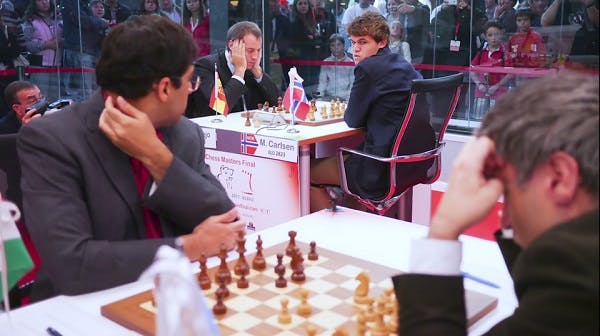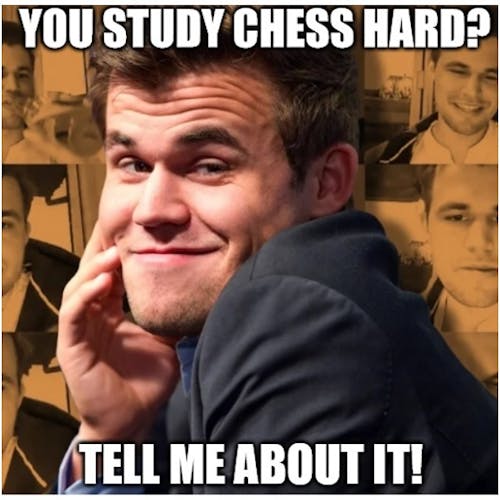Are you sure you want to delete your account?
(This will permanently delete all of your data - purchases, game scores, ratings, etc)
Change your username
Your current username is: guest
Change your account email address
Your current account email is:
Redeem your Fampay code here!
Use your Fampay code to get access to the Play Magnus Plus Membership!

Tournament Play Secrets: Where to Look For Your Opponent's Games
Let's say you play a tournament, preferably a traditional Swiss one with a classical time control where you find out your opponent's name the evening before the actual round. The first step when preparing for the upcoming match is reviewing the opponent's games. The big question is: where do you find them? Some of the ideas lie on the surface, but other tips might be of use to you.
Offline databases
If you are a competitive chess player, you probably have ChessBase, Chess Assistant, or other similar professional database installed on your laptop. Don't forget to update it regularly! Such databases are usually the primary source of opponents' games. In many cases, you won't need anything else if your chess partner plays many high-profile events that make it to the database.
Online databases
If, for some reason, you don't have a chess database installed on your PC, you can resort to online versions. There are plenty of sites that include a few million chess games. Still, the quantity of games there is usually lower than in chess software ones, and many key features that are crucial for successful preparation are missing.
Player profiles at chess sites
Surprisingly enough, many chess players list their real names on their online profiles. Recently I have had a lot of success doing online searches and finding large game collections by my opponents. This is extremely useful, especially in the COVID-19 age when people play fewer live events on average. Quite often, by looking at the online games, you will realize that your opponents are trying out new openings that you won't find in traditional databases. Also, the game sample is likely to be much larger since most of us play blitz and bullet online, increasing the number of games dramatically compared to traditional "slow" chess.
Hint: to make life harder for your opponents, consider carefully whether you want to provide complete information about your identity on your profile. A compromise could be to abbreviate your name. For instance, write John S. instead of John Smith. It will be much harder to google you this way.
In one of the recent tournaments, I couldn't find many games of my opponent in the offline database. However, I discovered plenty of them at one of the major chess sites! Also, I realized that one of his training partners was an FM whom I had already faced before in the tournament. Now I both knew my opponent's repertoire and could also "play around" the guy asking his friend for advice on approaching the game against me. More on the "ask a friend" tip below.
Other chess sites
Do a quick web search in general and see what info you can find about the opponent.
Maybe your opponent plays correspondence chess and has an ICCF profile?
What if he posts his best games on Facebook?
Have any of his games been mentioned in interviews or featured on chess forums?
Make sure to check the FIDE profile as well since there you can find valuable information about the tournaments the person has played in, some key stats and games (even though the feature seems to have been inactive lately).
Now let's move on to the "old school" methods that used to be around in the pre-computer age and still haven't completely lost their merits today:
Ask a friend or coach
If you are at a loss what your opponent plays, sometimes you can gather vital information from one of your chess buddies who have already faced the guy over the board. Actually, if they are insightful and experienced enough, they will also provide you with tips on the opponent's playstyle, time management, and other essential chess characteristics. This tip is particularly effective for local events where people keep playing pretty much the same frenemies over and over again year after year.
Look at other boards and train your chess memory
As you probably know, quite a few GMs walk around the playing hall on their opponent's move, observing other games of interest. To someone who is not accustomed to it and doesn't know typical middlegames structures associated with this or that opening, this could be a distraction and a waste of time and energy. In contrast, experienced masters quickly make mental notes ("Jones must have played the Najdorf against Klein and quickly got a fantastic position after employing an interesting plan that I haven't seen before"). Even if the games are not available online, sometimes you can recall such instances and take advantage of them while preparing for the round.
I recall traveling back home after a tournament with a GM rated about 2600, with who we were barely familiar. At some point, he started saying something like: "Ah, I remember, in the last round you played White against X. It was a French, and you castled long right into it! Quite unfortunate, right?". Needless to say, there were probably 100+ participants, and it's not like we were close friends who were supposed to keep track of each other's matches or that he needed that information for preparation. It is just an illustration of how well strong GMs keep track of games played around them.
Consult the tournament organizers
In the days of my chess youth, one of the main ways of preparation was hilariously naive by modern standards. After discovering who your next opponent is, you typically went to the organizer and asked him for scoresheets of the previous rounds. Being limited in time and not even having a smartphone to take an image of the scoresheets, you frantically scanned the games, trying to arrive at some conclusions. In most cases, you weren't able to find your opening of interest, so the best you could come up with was something "deep" like "it looks as if he plays 1.e4".
Somewhat later, tournament organizers started selling printouts of games for anyone interested. From what I have seen, this service was particularly popular with older people who didn't want to bother using computers themselves. Maybe they still practice this in some parts of the world.
Nowadays, sometimes you can find games from the previous rounds at the tournament site or Chess-Results.com. In the case of local events, some arbiters maintain their own private databases without passing them on to producers of chess databases. If you ask respectfully, sometimes you will be able to obtain for free essential information that can't be found anywhere else.
Want to get access to all our chess learning apps? Right now, you can save 30% on our Play Magnus Plus membership. Good luck with your training!

